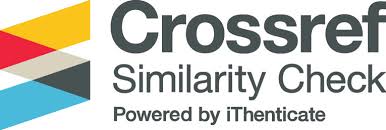Antihyperglycemic Activity of Aqueous Extract of Sukun Leaves (Artocarpus altilis (Park.) Fosberg) in Diabetic Rats Were Induced by Alloxan
Abstract
Sukun leaves is one plant that used for the treatment of diabetic. This study was aimed to determine antihyperglycemic activity of aqueous extract of sukun leaves, determine the extract dose which affect on blood glucose level, and determine the effect increased in dose of antihyperglycemic activity rats by alloxan induction. The method was used alloxan diabetic. Test animal were divided into five groups, consists of five male white rats: group I was diabetic control (CMC 0,5%), group II was comparative control (glibenclamide) at a dose of 0,09 mg/200 g BB rats, and group III, IV, V were given doses of aqueous extract of sukun leaves of 7 mg/200 g BB rats, 14 mg/200 g BB rats, 28 mg/200 g BB rats. Alloxan were induced on day 0 (after fasting 16 hours) intraperitoneally. Blood sugar levels were determined on days 4, 8 and 12 after administration of the test preparation. The results showed that aqueous extract of sukun leaves has antihyperglycemic activity. The aqueous extract sukun leaves affect by lowers blood glucose level with an effective dose of 7 mg/200 g BB. The greater the dose of aqueous extract of sukun leaves (7 mg/200 g BB rats, 14 mg/200 g BB rats, 28 mg/200 g BB rats) nothing with increased antihyperglycemic effect in significantly.












